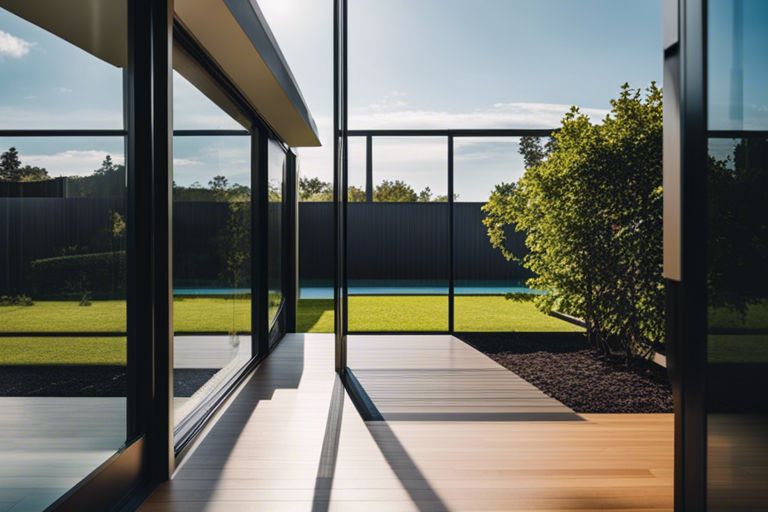Are you considering upgrading your home with sleek and durable aluminum window and door frames? With so many options available, it’s important to understand the different types of aluminum frames and their unique features to make the best choice for your home. From sliding and casement windows to french and sliding patio doors, each type has its own advantages and disadvantages. In this guide, we’ll take a closer look at the strengths, weaknesses, and benefits of each aluminum window and door frame type to help you make an informed decision for your home.
Key Takeaways:
- Aluminum Frames: Aluminum frames are lightweight, strong, and resistant to corrosion, making them an excellent choice for window and door applications.
- Thermal Break Frames: Thermal break frames feature a barrier that prevents heat transfer, improving energy efficiency and reducing condensation.
- Non-Thermal Break Frames: Non-thermal break frames are a more affordable option, but may not provide the same level of energy efficiency as thermal break frames.
- Anodized Frames: Anodized aluminum frames have a protective oxide layer that enhances durability and provides a sleek, modern appearance.
- Powder-Coated Frames: Powder-coated frames come in a variety of colors and finishes, offering customization options and increased resistance to scratches and fading.
- Extruded Frames: Extruded aluminum frames are made by forcing heated metal through a die, resulting in a strong and uniform cross-section that can accommodate various design elements.
- Rolled Frames: Rolled aluminum frames are formed from flat metal sheets, providing a cost-effective option with flexibility in design and customization.
Types of Aluminum Window and Door Frames
Now, let’s take a closer look at the different types of aluminum window and door frames available. Understanding the various options will help you make an informed decision when it comes to selecting the right frames for your home. Below is a breakdown of the different types of frames to consider:
| Sliding Frames | Casement Frames |
| Tilt and Turn Frames | Bi-fold Frames |
Any of these types of frames can be a suitable option for your home, depending on your specific requirements and preferences.
Sliding Frames
When it comes to sliding frames, they are a popular choice for modern homes. Their sleek, minimalist design offers unobstructed views and makes them perfect for smaller spaces. The smooth sliding mechanism allows for easy operation, making them a practical and stylish choice for your home.
Casement Frames
With casement frames, you have the advantage of being able to fully open the window, allowing for maximum ventilation and natural light. Their versatile design makes them suitable for various architectural styles, and they provide a timeless look for your home. Additionally, casement windows provide a tight seal when closed, offering excellent energy efficiency.
Tilt and Turn Frames
Tilt and turn frames offer versatility and functionality. They provide multiple ways of opening, allowing for easy cleaning and excellent ventilation. The tilt function allows for secure ventilation, while the turn function provides a wide opening for easy access and cleaning. Their practical design makes them a popular choice for many homeowners.
Bi-fold Frames
For a modern and stylish look, bi-fold frames are an excellent option. They create a seamless transition between indoor and outdoor spaces, making them perfect for entertaining. The ability to fully open the doors allows for unrestricted views and brings a sense of openness to your home. Their innovative design adds a touch of luxury and sophistication to any property.
Factors to Consider When Selecting Aluminum Frames
Your choice of aluminum window and door frames can greatly impact the overall performance, durability, aesthetics, and cost of your building project. When selecting aluminum frames, there are several important factors to keep in mind to ensure that you make the best decision for your specific needs. Below are some key considerations to guide you in your selection:
- Thermal performance
- Durability and maintenance
- Aesthetics and design compatibility
- Cost and budget considerations
Perceiving the importance of these factors will help you make an informed decision when choosing aluminum frames for your windows and doors.
Thermal Performance
When considering aluminum frames, it’s important to take into account their thermal performance. While aluminum is a good conductor of heat, modern thermal break technology can significantly improve their energy efficiency and help reduce heat transfer, ultimately saving you on energy costs. Insulated glazing and properly designed frame profiles can also enhance the overall thermal performance of the windows and doors.
Durability and Maintenance
One of the key advantages of aluminum frames is their exceptional durability and low maintenance requirements. Aluminum is resistant to corrosion, rot, and warping, making it suitable for various weather conditions. They also offer long-term reliability and require minimal upkeep, making them a cost-effective choice in the long run.
Aesthetics and Design Compatibility
The aesthetic appeal and design compatibility of aluminum frames should complement the overall style and architecture of your building. Aluminum frames offer sleek, modern, and versatile designs that can be customized to suit your preferences. They come in a variety of colors and finishes, allowing for seamless integration with your building’s exterior and interior design.
Cost and Budget Considerations
While the initial cost of aluminum frames may be higher compared to other materials, their long-term durability, low maintenance, and energy-saving benefits make them a cost-effective choice in the grand scheme of things. Consider your budget and weigh the upfront expenses against the long-term savings to make an informed decision that aligns with your financial goals.
Step-by-Step Guide for Choosing Aluminum Frames
Despite the wide variety of options available, choosing the right aluminum window and door frames for your home can be a straightforward process when you break it down into steps. To help you make the right decision, consider the following factors when choosing aluminum frames:
Assessing Your Needs and Preferences
Before you start looking at different types of aluminum frames, it’s important to assess your needs and preferences. Consider factors such as energy efficiency, durability, aesthetics, and maintenance requirements. Think about the style and design that best suits your home, as well as any specific features you may require.
Measuring for Proper Fit
Proper measurements are crucial when selecting aluminum frames for your windows and doors. You’ll need to measure the dimensions of the openings accurately to ensure a proper fit. Pay attention to the width, height, and depth of the frame as well as any specific requirements for installation. Taking accurate measurements will help you avoid any issues with fit later on.
Comparing Different Types and Brands
When comparing different types and brands of aluminum frames, it’s important to consider various factors such as thermal performance, durability, aesthetics, security features, and cost. Make a list of your top priorities and compare how different brands and types of aluminum frames meet these criteria. After carefully comparing, you can make an informed decision on the best option for your needs.
| Factors to Consider | Comparison Result |
|---|---|
| Thermal Performance | Determining factor for energy efficiency |
| Durability | Long-term lifespan and maintenance requirements |
| Aesthetics | How well it complements your home’s design |
| Security Features | Enhanced protection against intruders |
| Cost | Overall affordability and value for money |
Understanding Installation Requirements
Before making a final decision, it’s essential to understand the installation requirements for the chosen aluminum frames. Different types and brands may have specific installation guidelines that you need to follow to ensure optimal performance and longevity. Your chosen supplier or installer can provide you with detailed information on the installation process.
Understanding the Different Types of Aluminum Window and Door Frames
Pros and Cons of Aluminum Window and Door Frames
For a comprehensive understanding of the pros and cons of aluminum window and door frames, refer to this detailed article from GharPedia. Here, we’ll highlight some of the key advantages and potential drawbacks of choosing aluminum frames for your windows and doors.
Advantages of Aluminum Frames
Aluminum frames offer several advantages, including their durability, resistance to corrosion, and ease of maintenance. Additionally, aluminum frames are known for their strength, which allows for the creation of larger and more expansive window and door designs. They are also highly customizable and come in a variety of finishes to complement your home’s aesthetic.
Potential Drawbacks and Considerations
While aluminum frames have many advantages, it is important to consider their potential drawbacks. Aluminum is a good conductor of heat, which can lead to energy loss if not properly insulated. Additionally, aluminum frames are susceptible to condensation, which can lead to moisture-related issues such as mold and mildew if not properly managed. Furthermore, aluminum frames may not be as cost-effective as other materials upfront, although their durability often offsets this initial investment.
Tips for Mitigating Common Issues
When choosing aluminum window and door frames, there are several steps you can take to mitigate their potential drawbacks. Make sure to invest in high-quality, thermal-break aluminum frames to minimize heat transfer and energy loss. Additionally, proper insulation and ventilation are essential for preventing condensation-related issues. When it comes to cost, consider the long-term benefits of aluminum frames in terms of durability and low maintenance. You can also opt for powder-coated finishes to enhance the resistance of the frames to corrosion and wear. Recognizing these considerations will help you make an informed decision when selecting aluminum window and door frames for your home.

Conclusion
Considering all points, understanding the different types of aluminum window and door frames is essential for making informed decisions about your home or building. By knowing the advantages and disadvantages of each type, you can select the frame that best suits your requirements for durability, energy efficiency, and aesthetics. Whether it is thermally broken, non-thermally broken, or reinforced aluminum frames, you can make the right choice based on your specific needs. Additionally, understanding the differences between these frames will allow you to communicate effectively with vendors and contractors, ensuring that your windows and doors are installed to your satisfaction. With this knowledge in hand, you can confidently choose the aluminum frames that will serve you best in the years to come.
Understanding the Different Types of Aluminum Window and Door Frames
Q: What are the different types of aluminum window and door frames?
A: The different types of aluminum window and door frames include standard aluminum frames, thermally broken aluminum frames, and composite aluminum frames.
Q: What are standard aluminum frames?
A: Standard aluminum frames are non-thermal barriers and are cost-effective. However, they are more susceptible to heat and cold transfer compared to other types of frames.
Q: What are thermally broken aluminum frames?
A: Thermally broken aluminum frames consist of a strip of insulation material between the inside and outside of the frame, creating a thermal barrier. This design reduces the transfer of heat and cold, making them more energy-efficient.
Q: What are composite aluminum frames?
A: Composite aluminum frames are made from a combination of aluminum and other materials such as wood or vinyl. This provides the strength and durability of aluminum with the added benefit of insulation and aesthetics of other materials.
Q: What are the benefits of aluminum window and door frames?
A: Aluminum frames are lightweight, strong, durable, and low maintenance. They are also resistant to corrosion, making them suitable for various weather conditions.
Q: Are aluminum frames energy-efficient?
A: While standard aluminum frames are less energy-efficient, thermally broken aluminum frames provide better insulation and can help reduce energy costs by preventing heat or cold transfer.
Q: How do I choose the right type of aluminum frame for my windows and doors?
A: Consider factors such as climate, energy efficiency, budget, and aesthetics when choosing the right type of aluminum frame. Consult with a professional to determine the best option for your specific needs.
Q: Can aluminum frames be customized?
A: Yes, aluminum frames can be customized in terms of color, finish, and design to suit the architectural style and preferences of the homeowner. Customization options range from anodized or powder-coated finishes to different frame profiles and sizes.






